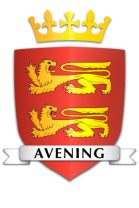

© Avening Parish Council 2023
“Preserve, Conserve, Enhance”
35 Percy Lynn Hill
Sergeant: 6th Siege Battery, Royal Garrison Artillery "...but by going to a battery, I am after a step higher than sergeant. Of course, it will mean taking a chance out in France...." So wrote Percy to his mother in July 1917. Percy Hill had obviously taken well to army life. We think he volunteered for Army Service in 1915 and remained in Home Service for some time. By mid-1917 he already had won promotion to corporal and was keen to progress further. He had been offered a post of instructor at the Gunnery School which did not appeal to him. He was a "team player" and relished the thought of becoming a part of a team in a gun battery where, serving with the Royal Garrison Artillery, he would have been member of a party operating a heavy gun near the front line. In his letter, after refusing the instructor's post, he was expecting an early embarkation to France but this didn't happen immediately, as when he married in our church in November, he gave his address as Winchester. The marriage was by licence rather than banns which may mean he was on embarkation leave. His wife was Esther May, the daughter of Alfred May of Minchinhampton and Avening who, in 1901, was living at "Church Cottage", now "Mullions" at the church gate. Alfred and his wife, 5 sons and Esther, lived in the four rooms at the cottage, the remainder of the property being a bakery. After their marriage, Esther and Percy lived at Point House. There were no children. Percy got the promotion he expected and he was posted to France sometime after his marriage. In March 1918, he was in the front line facing the Germans in their last "Big Push" and it was then that Percy won the Distinguished Conduct Medal. A report in the Stroud News of the 18th of October 1918 says: "...When an enemy shell burst under his gun and destroyed half of his detachment, this NCO, although knocked off his feet and badly shaken, collected the rest of the men and continued firing the gun. It was entirely owing to his example under this heavy fire that the section remained steady...." The tragedy of this article was that it was published some ten days after Percy had died. Knowledge of his death did not become available until November and was not reported in the Stroud News until the 15th of that month. Percy was killed on Tuesday the 8th of October. He was buried in France at Templeux-le-Guérard Cemetery, 20 miles east of Péronne. He lies beside Gunner John MacDonald of the Australian Field Artillery who died the same day. In civilian life, Percy had been a baker, following in the footsteps of his father and grandfather. He was one of ten children, born to William Griffin Hill and his wife Mary Ann (née Lynn) who had been born in Norfolk. Esther would have received his DCM, British and Victory medals sometime later. We are indebted to Jim Hill, Percy's nephew, for his assistance.
AveningArchive
WW1 Heroes





© Avening Parish Council 2023
AveningArchive
WW1 Heroes
35 Percy Lynn Hill
Sergeant: 6th Siege Battery, Royal Garrison Artillery "...but by going to a battery, I am after a step higher than sergeant. Of course, it will mean taking a chance out in France...." So wrote Percy to his mother in July 1917. Percy Hill had obviously taken well to army life. We think he volunteered for Army Service in 1915 and remained in Home Service for some time. By mid-1917 he already had won promotion to corporal and was keen to progress further. He had been offered a post of instructor at the Gunnery School which did not appeal to him. He was a "team player" and relished the thought of becoming a part of a team in a gun battery where, serving with the Royal Garrison Artillery, he would have been member of a party operating a heavy gun near the front line. In his letter, after refusing the instructor's post, he was expecting an early embarkation to France but this didn't happen immediately, as when he married in our church in November, he gave his address as Winchester. The marriage was by licence rather than banns which may mean he was on embarkation leave. His wife was Esther May, the daughter of Alfred May of Minchinhampton and Avening who, in 1901, was living at "Church Cottage", now "Mullions" at the church gate. Alfred and his wife, 5 sons and Esther, lived in the four rooms at the cottage, the remainder of the property being a bakery. After their marriage, Esther and Percy lived at Point House. There were no children. Percy got the promotion he expected and he was posted to France sometime after his marriage. In March 1918, he was in the front line facing the Germans in their last "Big Push" and it was then that Percy won the Distinguished Conduct Medal. A report in the Stroud News of the 18th of October 1918 says: "...When an enemy shell burst under his gun and destroyed half of his detachment, this NCO, although knocked off his feet and badly shaken, collected the rest of the men and continued firing the gun. It was entirely owing to his example under this heavy fire that the section remained steady...." The tragedy of this article was that it was published some ten days after Percy had died. Knowledge of his death did not become available until November and was not reported in the Stroud News until the 15th of that month. Percy was killed on Tuesday the 8th of October. He was buried in France at Templeux-le-Guérard Cemetery, 20 miles east of Péronne. He lies beside Gunner John MacDonald of the Australian Field Artillery who died the same day. In civilian life, Percy had been a baker, following in the footsteps of his father and grandfather. He was one of ten children, born to William Griffin Hill and his wife Mary Ann (née Lynn) who had been born in Norfolk. Esther would have received his DCM, British and Victory medals sometime later. We are indebted to Jim Hill, Percy's nephew, for his assistance.


























